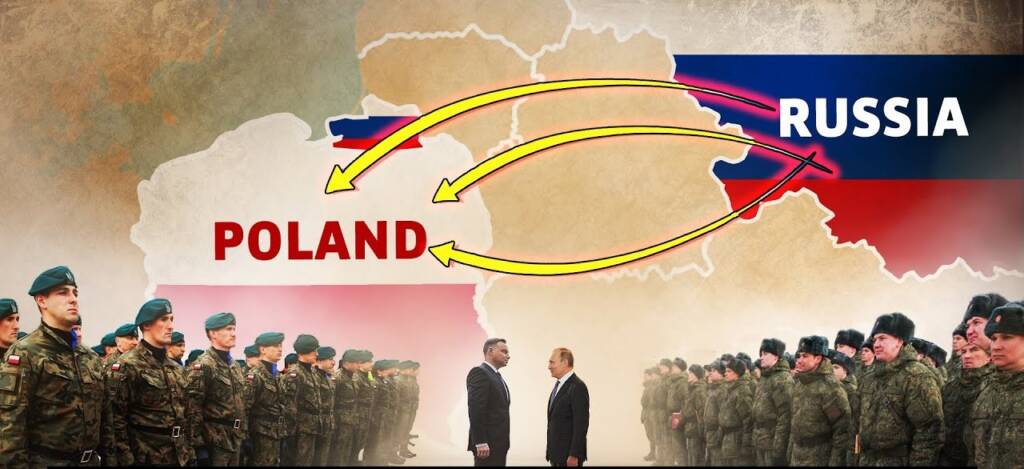Poland is preparing to enter the sacrificial fire hoping the US, France and UK will douse it. Stupid move.
In a significant display of political unity, Polish President Andrzej Duda and Prime Minister Donald Tusk, despite their political differences, jointly met with U.S. President Joe Biden in Washington, D.C. This meeting marked the 25th anniversary of Poland’s membership in NATO and was characterized by their unified appeal for increased aid to Ukraine.
Join us on Telegram: https://t.me/tfiglobal
Concurrently, internal debates within Poland’s political sphere regarding NATO’s involvement in Ukraine have surfaced. Deputy Defense Minister Marcin Wziatek’s recent statements have contradicted Foreign Minister Radosław Sikorski’s endorsement of French President Emmanuel Macron’s proposal for NATO’s conventional intervention in Ukraine.
Adding to the geopolitical tension, Russian President Vladimir Putin issued a warning, suggesting that if Polish forces were to enter Ukraine, to protect its border with Belarus or to assist Ukrainian forces, they will never withdraw. Putin said that Poland harbors historical territorial claims that might motivate such a military presence, insinuating that Polish involvement could lead to a permanent change in the region’s dynamics.
Read More: Orbán and Fico have made converts out of Czech Republic and Poland
As the situation evolves, the accuracy and implications of Putin’s assessment will be closely scrutinized in light of ongoing and potential future developments in the region.
Strategists globally have been analyzing Poland’s strategy to recapture Western Ukraine through economic rather than military means. Even Hungarian and Romanians wish to reclaim territories lost to Ukraine, hindered by significantly altered post-World War II demographics—a factor also pertinent to Poland.
By mid-February, the dynamics shifted following Russia’s victory in Avdeevka, amplifying the possibility of a breakthrough across the Line of Contact (LOC) later in the year. This situation prompted French President Emmanuel Macron to propose a conventional NATO intervention to support Ukraine.
The reaction to Macron’s proposal among Western leaders was predominantly tepid, except for support from the Baltic States and an implied endorsement from Polish Foreign Minister Sikorski. This endorsement, however, was somewhat belated and followed a contradictory statement from Deputy Defense Minister Wziatek.
Prime Minister Tusk’s hesitation to engage directly with Russia without explicit NATO support stems from a concern that Poland could be left vulnerable if its forces encountered Russian military might. Without this assurance, Poland might only consider participation alongside nuclear-capable allies like France and the UK, who could potentially employ nuclear brinkmanship should the US advise NATO against extending Article 5 protections to member forces operating in a third country.
Ideally, for Poland, the United States would endorse the mission and accept a contentious interpretation of NATO’s collective defense obligations to ensure Poland’s security in the event of conflict. This shared apprehension of Russian aggression is what drives President Duda and Prime Minister Tusk to exhibit a rare political solidarity. This unity could potentially lead to a consensus on Poland’s conventional intervention in Ukraine, aiming to halt Russian advances should the situation at the frontlines deteriorate.
Read More: Ukrainian Defence Minister EXPOSED NATO’s AGENDA
Poland’s idea of formally reclaiming territories lost to Ukraine after 1939 is hindered by socio-economic challenges and public resistance. Economic downturns and a poll showing 40% of Poles view Ukrainians as a threat illustrate the difficulty of incorporating over 6 million Ukrainians into Poland, significantly changing its ethno-religious composition and straining taxpayer resources. Redirecting funds to these “recovered territories” would likely neglect Poland’s own development and aggravate tensions among those already wary of Ukrainians, with Polish farmers particularly opposed due to the threat of cheap Ukrainian imports.
So Poland is making 2 big mistakes here. The first mistake is trusting the US, France and the UK for having its back when the Russian bear comes charging in. Because history has shown that the most these countries would do is issue stern warnings and impose economic sanctions. The second big mistake of Poland is subjecting Polish people to immigrants and impoverished war torn territories. That’s a recipe for a civil war.
